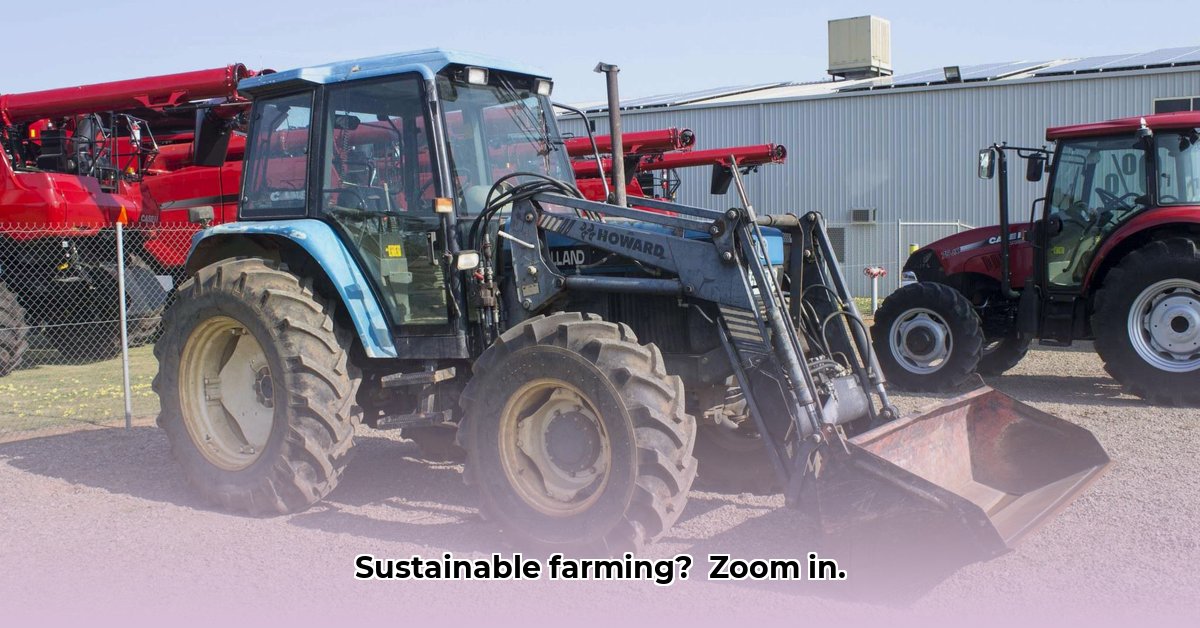
A New Era for Sustainable Agriculture?
Tractor Zoom's recent appointment of Cindy Howard as head of customer success signals a potential shift towards greater sustainability within the agricultural technology sector. While specifics remain limited, Howard's diverse background suggests a strategic focus on empowering farmers to adopt sustainable practices through effective technology utilization. This article analyzes the implications of this hire and explores the potential impact on Tractor Zoom's sustainability efforts, acknowledging the current lack of detailed public information. For more on sustainable liquid fertilizers, check out this resource.
Cindy Howard: A Unique Profile for Agricultural Technology
Cindy Howard's career trajectory is noteworthy. Her experience extends beyond traditional agriculture, encompassing roles in the pharmaceutical industry and animal science. This unique combination of skills positions her to bridge the gap between complex technological solutions and practical farmer adoption. Her expertise in product development and user education is particularly valuable in the rapidly evolving field of precision agriculture. How will this experience translate into concrete sustainable farming initiatives at Tractor Zoom? The answer remains partially obscured but is undoubtedly a key factor in this development.
Sustainable Farming: The Broader Context
While Tractor Zoom's commitment to sustainable agriculture is implied by this hiring, the company's comprehensive strategy remains largely undefined. Public statements lack specific, measurable goals, hindering a complete assessment of their commitment. However, Howard's background in animal science suggests a potential focus on precision livestock farming—an area with significant potential for resource optimization and improved animal welfare. This directional clue, while suggestive, requires further substantiation through more transparent communication from Tractor Zoom. Does this hint at a broader sustainability focus? More data is needed to confidently conclude.
Interpreting the Available Data
Based on the currently available information, we can infer that Tractor Zoom is prioritizing customer success in the context of sustainable farming practices. The company's apparent focus on optimizing user experience and providing effective training suggests a commitment to facilitating the actual adoption of new, sustainable technologies. However, without more transparent information from Tractor Zoom, much of this analysis remains speculative. What specific support systems are in place? How effectively will these help farmers truly integrate sustainable practices? These questions await definitive answers.
Unanswered Questions: The Need for Transparency
Several critical questions remain unanswered, limiting the scope of our analysis. What specific tools and technologies does Tractor Zoom offer to support sustainable farming? What is the precise nature of the training and technical assistance provided to farmers? What metrics will Tractor Zoom employ to measure the success of their sustainability initiatives? A lack of transparency surrounding these key aspects hinders an objective evaluation of Tractor Zoom’s commitment. The company's proactive communication about its sustainability strategy is crucial for building trust and confidence.
Looking Ahead: Potential and Challenges
The potential of the Cindy Howard-Tractor Zoom partnership is significant, offering an opportunity to significantly improve the reach and impact of sustainable farming technologies. The challenge, however, lies in effectively communicating this commitment and proving tangible results. The coming years will be instrumental in demonstrating whether Tractor Zoom can translate this potential into real-world impact within the agricultural community. Transparent reporting on progress will be vital in gaining the trust of farmers and investors.
How Tractor Zoom's Technology Could Support Sustainable Farming
Cindy Howard's appointment raises questions about the specific role of Tractor Zoom's technology in achieving sustainable practices. How will its current and future innovations contribute to environmental responsibility? Let's explore the potential.
Precision Agriculture: A Foundation for Sustainability
Tractor Zoom's core technology relies on the principles of precision agriculture, making use of GPS, sensors, and data analytics. This allows for the targeted application of inputs like fertilizers and pesticides, reducing waste and minimizing environmental impact. Through precise application, significant reductions in chemical runoff and soil erosion are possible.
Data-Driven Optimization: Resource Management
The data collected by Tractor Zoom's systems enables optimized resource allocation. Farmers can make informed decisions about irrigation scheduling, reducing water consumption, and improve route planning to minimize fuel usage. Real-time monitoring allows for proactive problem-solving, preventing larger-scale issues down the line.
Challenges to Widespread Adoption: Connectivity and Accessibility
Despite the potential of Tractor Zoom's technology, significant challenges remain. Reliable internet access in rural areas is a critical prerequisite. The digital divide poses a barrier to adoption, particularly for smaller farms and those in less developed regions. Overcoming this requires concerted efforts from technology providers, governments, and agricultural support organizations.
The Future of Sustainable Farming: Technological Advancement
Tractor Zoom's technology has the potential to significantly advance sustainable farming practices. However, sustained investment in research and development, along with addressing accessibility and affordability challenges, are critical for widespread adoption. The company's long-term commitment to sustainability will be crucial in determining both the environmental impact and economic viability for farmers.
Key Takeaways:
- Tractor Zoom's hiring of Cindy Howard signals a potential shift towards a greater emphasis on sustainability.
- While details remain scarce, Howard's unique background suggests a focus on empowering farmers to utilize technology for sustainable agriculture.
- Transparency and clear communication regarding Tractor Zoom's sustainability goals are crucial for building trust and fostering broader adoption of their technologies.
This analysis relies on publicly available information and speculation based on available data. Further information from Tractor Zoom is needed for a more comprehensive assessment.